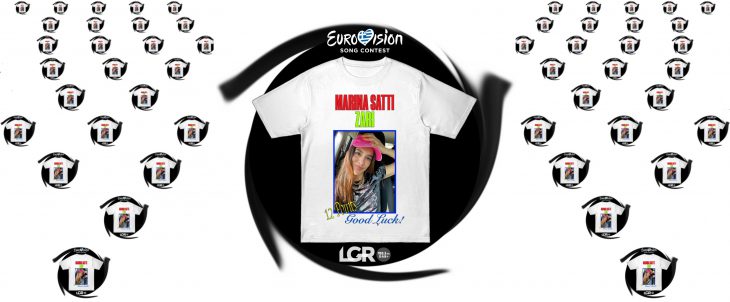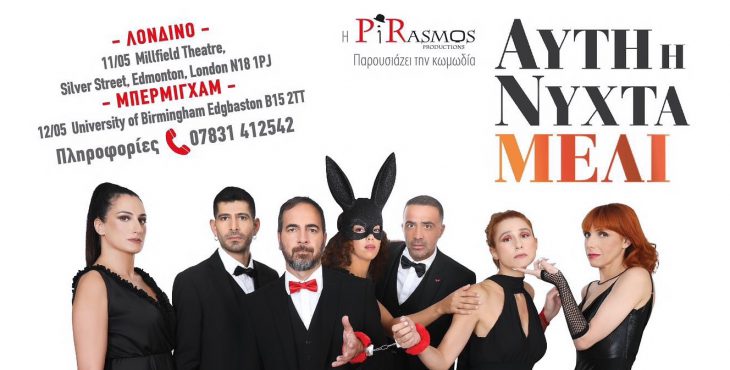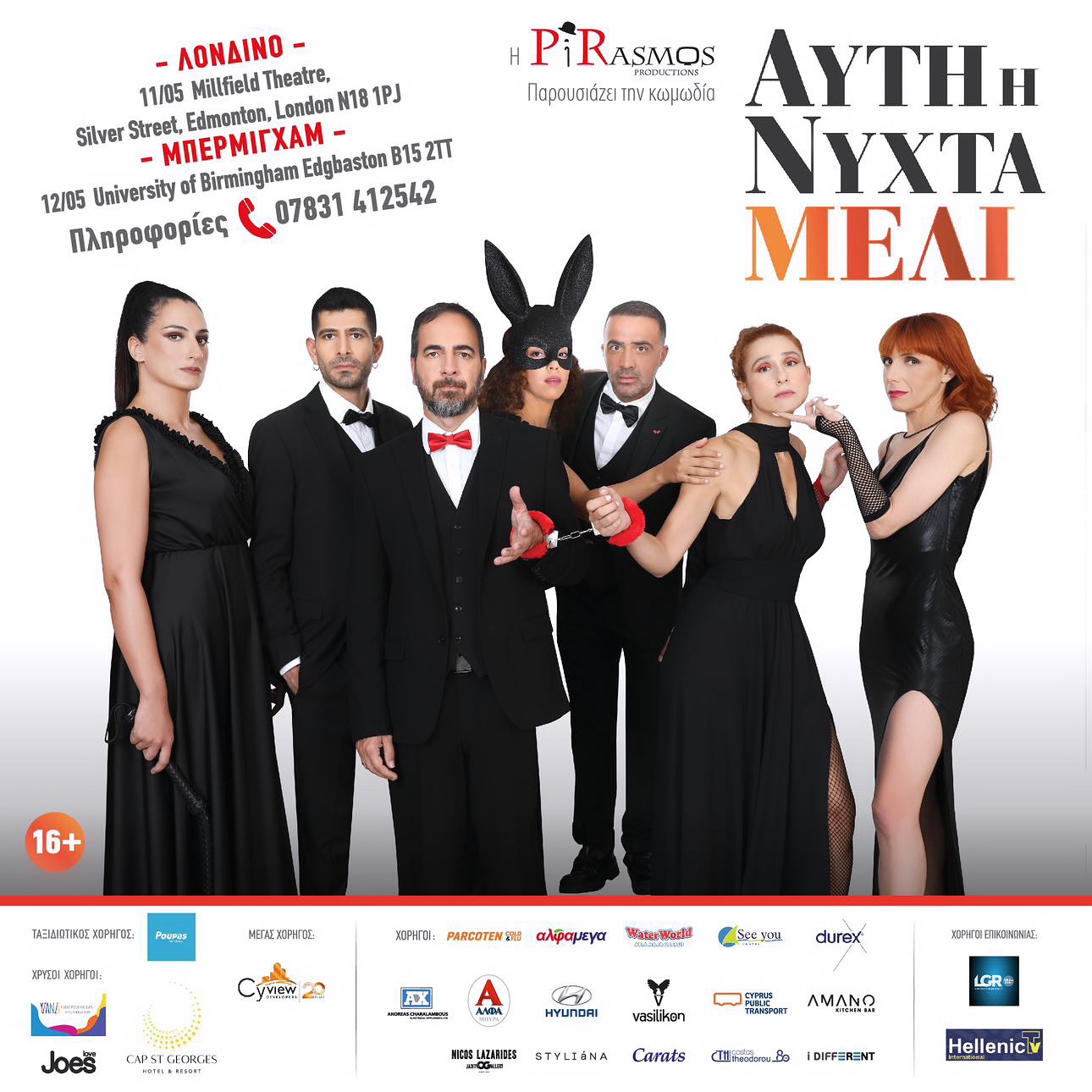NEWS

8-month-old baby British Cypriot Saylor needs your help.
This is an urgent appeal to save Saylor an 8-month-old baby girl, with a Greek Cypriot grandfather. Saylor has been diagnosed with a very rare type of leukaemia called JMMl affecting only 1 in a million children. Her only hope is a stem cell transplant, we are desperately appealing to people aged 17 to 55 from the Greek Cypriot community and beyond to become a donor.
All it takes is a cheek swab which is simple and painless. Please register on-line today and order your swab kit at dkms.org.uk, you could be the match to save Saylor.
Every 20 minutes, someone in the UK is diagnosed with blood cancer – those that affect the body’s bone marrow, blood or lymphatic system – such as leukaemia, myelome or lymphona. Yet, just 2% of the UK population is registered as potential blood stem cell donors. People from Cypriot, Greek and mixed ethnicity backgrounds are under-represented as donors.
Diversifying the register is extremely important to people from our community.
dkms.org.uk or scan the QR Code to register today.

Article written by London Greek Radio

Helena Paparizou will announce Greece’s 12 points!
Greece’s Eurovision winner Helena Paparizou will be the spokesperson announcing the Greek jury’s 12 points on Saturday night at the Eurovision Song Contest Finale live at Malmö Arena.
Helena appeared on Thursday nights second semi-final and wowed the arena with a live rendition of “My Number One” during the sing-along medley. We admit to feeling teary eyed with the victorious Eurovision song still sounding as fresh and exciting as ever.
Born and raised in Sweden, Paparizou commanded the stage with her solo act, busting a few Greek dance steps and yelling “Opa!” to the crowd’s delight.
The interval act also featured former Eurovision winners Sertab Erener (Turkey 2004) and Charlotte Perrelli (Sweden 1999).
Greece’s Eurovision entrant Marina Satti with the ethno-banger “ZARI” (Greek word for = dice) went through on the night. Both Helena and Marina at the semis, lady luck, rolling out a couple 6’s at the Greek’s bequest.
Fun fact also, the “My Number One” co-writer is the iconic Christos Dantis, who’ll be headlining our Greekology event in July alongside former Cypriot Eurovision star Konstantinos Christoforou.
Helena has an inextricably close bond to Eurovision: in 2001 she was one-half of Antique with “Die For You”, finishing third in Copenhagen. In 2005, she won the contest in Kyiv and welcomed the world to Athens in 2006. In 2021, Paparizou participated at the “Rock The Roof” party in Rotterdam, in The Netherlands.
Helena who celebrates a 25-year milestone in the music industry, recently released the ultimate “club banger of 2024”. The single “Mavra Gialia” is now on the LGR playlist and fast-tracked to become a mega hit this summer.
She is also soon set to release her eleventh-studio album later this year, mixing pop, dance-floor-rhythms, R&B and the ethnic motif.
Pic (credit): Tryfonas Nakis
Marina Satti unleashes infectious vibes with “ZARI”, Greece’s 2024 Eurovision Entry
Article written by Tony Neophytou

“The Greek instrument of the zournas standing out in the mix. It makes “ZARI” powerful and exciting”.
As Eurovision excitement heats up, Marina Satti’s “ZARI” (Greek word for = dice) is set to take the stage at the Eurovision Song Contest 2024 in Sweden at the Malmö Arena.
Satti will perform in the second semi-final tonight batting for a place at the final on Saturday.
The Eurovision hit song “ZARI” mixes traditional Greek melodies with a modern template. The up-tempo Greek banger feels current and on-trend with Greek music and local charts. It is a unique and original song with a mix of avant-garde and mainstream sounds. It blends ethno-pop with pop-laika, tsifeteli and hip-hop which is very modern and current.
The Greek delegation at Eurovision is setting out to rejuvenate the nation’s fortunes with this entry with a hopeful top 10 finish like classic 00s and 10s’ entries: Songs that were always catchy, super-fun and felt like genuine Greek songs.
Instantly triggering recognition as a Greek song, with the tabla percussion and the zournas standing out in the mix, “ZARI” is both powerful and exciting. It is catchy, contagious and addictive, claims our Eurovision man. It is a production with a strong bassline that reverberates when the volume is turned up full notch with the Ta-Ta-Ta vibrating through the floor at the LGR studio.
Tony Neophytou LGR’s ‘Eurovision fanatic’ says, “Satti is the experimental singer-songwriter and ZARI is a weird and wonderful song. It is brimming with Satti’s personality a little on the ‘brave, bold and brilliant’ side, is the eclectic Eurovision song and not too unlike her hit song “Tucutum” from last year.”
“ZARI” has an elevated ethno female bop with the eclectic Satti style we know, distinctive as a Greek-language song with a true cultural identity, Mr Neophytou views.
“The multiple hooks and a super lush, sumptuous bass are driving a strong song, with the syncopated rhythm demanding your attention. The woah moments and the most unexpected twists and turns have a captivating feel and it’s like a smack or a hit in the gut.” Tony adds. The hook is the useful asset a Eurovision song requires to create a strong impression.
Her closest allies whittled down through 150 songs before landing on this “competitive song” that stands on its feet, as a stage and TV-alluring package. “ZARI” is a hot-take of a Eurovision-engineered song, Satti says.
It is gutsy like lady luck with a dice roll and a fresh track shaking things up. A risky song, it’s like different sides of a zari, or dice, with layers and parts each congruent to each other. This sounds much better on repeat noticing the intricate details in the song. It’s the sort of song “to marinate on all the aspects it stitches together as a studio cut, it’s like a Greek spice with seasoning and feeds our appetite” our LGR ‘man’ says.
“ZARI” mixes up-beat and melancholic vibes – the quieter parts feel introspective. A creeping bass line and subtle drums provide a backdrop for Satti’s head-voice intro that quickly builds up to a fast tumba beat with a climax that feels exhilarating.
Satti blends groovy feels and airy vocals with its crowd-pleasing song. It is mostly sung in Greek, with the “put your hands up” verse switching up with a sweet urban spot.
The studio song is a club and radio-friendly hit for sure. The staging of the performance will be elevated with unique urban visuals and aesthetics with on-point vocals.
A 30-second teaser of the Greek staging is presenting a cohesive stage concept. The long, continuous shot focusses on Satti and the dancers whilst she looks into the camera to connect with the audience. The staging is bright, well-lit with neon colour palette, graffiti graphics and the floor alternates to blue with a nod to the Greek flag. They then pull-out handkerchiefs for a routine to the syrto and kalamatianos, which feels very Greek.
The official music to “Zari” had the quick cuts through the streets of Athens to add to the up-beat vibe to this song. “I am curious at the staging for this and how it channels the infectious vibe to the stage.” Mr Neophytou adds.
Satti’s team is made up of Creative Director Fokas Evangelinos, Mecnun Giasar (Majnoon) is the choreographer, and art direction by NMR.
Satti will perform with four dancers – Huso Cetintas, Vassilis Karagiannis, Yasin AO and Eirini Damianidou. Her backing-vocalist is Erasmia Markidi.
“Zari” was composed by Satti, OGΕ, Nick Kodonas, Kay Be, Jay Stolar, Gino The Ghost, and Jordan Palmer, with lyrics penned by VLOSPA, OGΕ, Satti, and Solmeister.
The official music video had taken a rather quirky slant poking fun at the perceived stereotypes of Greek people and its aesthetics are TikTok-inspired.
“Zari” since its release has smashed stream numbers and gone super-viral. Marina is only the with second female artist ever since Eleni Foureira to top the Greek Spotify chart.
The track released on digital and streaming services hit 10.000.000 streams on Spotify, gaining double platinum one month after its release. The music video surpassed 11 million views, a record-breaking statistic for a Greek Eurovision entry.
Fun trivia also, Greece have a lucky streak at Eurovision in Malmo, with Top 5th and Top 6th finishes, i.e. Koza Mostra featuring Agathonas “Alcohol is Free” (2013), and Cleopatra “Olou Tou Kosmou I Elpida” (1995), to be exact.
Luck, be a lady at the Eurovision semi-final tonight. Satti is rolling a couple of 6’s smashes the tele-vote and qualifies. Satti performs #3 in the running order of 16.
London Greek Radio wishes Greece and Marina Satti the best of luck at the competition.
Article written by Tony Neophytou

Tonight Cyprus compete at the Eurovision Song Contest Semi-Final 1, which airs at 8pm BST. The song, which will be performed by 17-year-old Australian born Cypriot-Greek rising star Silia Kapsis, will be flying the flag high at Malmö with “Liar”.
Cyprus have a couple of acts, one from 2018, namely Eleni Foureira she will sing a minute-version to “Fuego” opening the semi-finals this year. The current Cypriot act Silia will be immediately on next, song #1!
CyBC made the official announcement last September with Kapsis’ song written by Greek songwriter, composer, and producer Dimitris Kontopoulos, well-known in Eurovision circles. He also collaborates on the track with lyricist Elke Tiel.
The up-tempo Cypriot entry “Liar” is a dance-pop banger, addressing themes of misplaced trust, deception, self-worth, and truth in a world of fake news and lies.
A well-made, radio-friendly and catchy Eurovision number, it is a bombastic production with nice brass elements; the song’s intro siren captures the attention. It ebbs and flows with the punchier bass and a climatic dance break is a strong dynamic to the track.
Silia is a super-talented singer, dancer, and actress, making up a solid Eurovision entrant and will be very promising for Cyprus’ chances. The CyBC hierarchy believe that the singer is the perfect entrant for this year’s contest.
Cyprus has big ambitions for this year’s contest, bringing on board renowned choreographers Kelly Sweeney and Guy Groove including Cypriot creative Charis Savvas.
Cyprus’ official music video “Liar”, the country’s Eurovision promo for this year’s contest, was released on 29th February. Silia is the star of the music video directed by Kostas Karydas, filmed at the City of Dreams Mediterranean hotel in Limassol. It teases her strength as a skillful mover, for the much more elaborate stage routine later at the contest for this song.
The self-aware nods to Silia and her “Liar”, through lyrics “Shoulda known that you are a liar, but I looked the other way”, is coupled with a fearless look, she’s got the sass and power to live her truth.
The CyBC Eurovision page explains the concept. “In the said video… we see through the eyes of Silia Kapsis a series of oppressive situations that a fake world and the negative side of social media often impose. In the second part of the music video, we see Silia Kapsis reacting to these situations, rocking the boat and daring to live her truth while at the same time inspiring others to follow her in a celebration of liberating oneself from such lies.”
LGR’s ‘Eurovision fanatic’ Tony Neo said: “Silia is a likeable soul and a promising act. She is a youthful, exuberant, exciting, and emphatic lively dancer. She’s skillful at urban street dance which is current and now. The hints from her music video to Liar suggest she possesses the skills-set and assets which an energetic Eurovision song requires. Her stage presence and charisma which no doubt help to elevate this song. We’ve been following Silia since last year and we are excited to finally hear the song!”
Silia is simultaneously singing and dancing and her four dancers are all Danish with Theo B. Koefoed, Thomas Hegnet, Sebastian Laurentius Nielsen and Martin Daugaard. The stage concept is imagined by Guy Groove and Kelly Sweeney, while Charis Savvas is in charge of the rehearsal in Athens. Her vocal coach is Victoria Chalkitis, known to work with artists for the big occasion.
Cyprus‘s staging is of well-known Eurovision Creative Director Dan Shipman of Black Skull Creative working alongside Martin Dietmann.
“I have my fingers crossed for the song’s chances. It feels as though a visually captivating treat is on-the cards,” Mr. Neophytou says.
Cyprus competes in Semi-Final 1 at Malmö Arena on Tuesday night the 7th of May at 8pm on BBC 1. Silia performs in slot #1 in the running order of 15.
The Eurovision Final takes place on Saturday 11th May, on BBC 1 and London Greek Radio wishes Silia and Cyprus the very best of luck in the competition.
Btw, UK is tele-voting nudge, nudge, wink, wink… not that we’re hinting don’t you know 😉 🇨🇾
Follow Silia Kapsis on instagram at: @silia_kapsis.
Article written by Tony Neophytou

Cypriot play “This Night Honey” coming to the UK, part of the proceeds will be donated to the charity Alkionides UK.
The theatre group of the popular actor and director Lori Loizidis is travelling to London for the first time to present the successful theatrical comedy “This Night Honey” on Saturday 11th May 2024 at 7.30pm at Millfield Theatre, in Edmonton North London. Birmingham, Sunday 12th May at 7.30pm at University of Birmingham.
Entry: 16+ years-old
A couple decides to break the routine of their long-term relationship by taking an escape to a luxury resort in Pegeia, Paphos. The luxurious suite of the hotel and the incredible view against the background of the endless blue seem like the ideal setting for the rekindling of passion in their love life.
Will their venture have a successful outcome? Or will their love affair end ignominiously? An important role in the achievement of the goal will be played by the theatre audience as the spectators during the play will be invited to take part in a group “psychotherapy” giving advice to the couple and partly determining the outcome of the play.
The elements of the play compose a unique mosaic of incredible laughter, love, romance, and authentic love. Through the script, the viewer will have the opportunity to travel musically to nostalgic times. Back when everything was more innocent, more direct, and simpler.
Actors : Loris Loizidis, Michalis Sofokleous, Maria Mastridou, Maria Papakosta, Stella Filippidou, Irini Salata and Konstantinos Tsitsios star in the show.
11/05/2024 at 7pm, at Millfield Theatre, at Edmonton, North London to spend two hours of incredible laughter and at the same time travel back in time, to beautiful and nostalgic times.
12/05/2024 at 7.30pm, Birmingham, University of Birmingham Edgbaston B15 2TT.
It is worth noting that part of the proceeds will be allocated to support the charity Alkionides UK.
Text – direction Loris Loizidis
The show is suitable for people over 16 years old.
Tickets are priced at £35 & £30 pounds from Millfield Theatre. Start time of the show: 7:30pm
https://www.millfieldtheatre.co.uk/whats-on/this-night-honey/
For more information 07831 412 542
MEDIA SPONSORS: LGR & HELLENIC TV

Article written by London Greek Radio

LGR 103.3 FM is the official media sponsor of Josephine live in London. 🇬🇧 One of the hottest acts on the Greek music scene, Josephine will be appearing at the world-renowned Lola’s Hippodrome Casino Leicester Square, on the 28th of March. This marks her first concert in London after the success of her recent album “Ta Kala Koritsia”.🔥
Josephine has become one of the biggest female superstars in Greek music, releasing a string of consecutive hits.
Her latest album “Ta Kala Koritsia” includes hit songs such as ” Tilefono”, “Berdemata”, “Kathrefti Kathreftaki Mou”, “Poly Poly”, “Eisai Mia Thea (2023 Version)”, “Pirkaya”, “Kyma Mou” and “Geia Sou”.
Get ready for an exclusive night at The Hippodrome Casino with Josephine alongside DJ Andreas Michaelides and DJ George Michaelides plus special guests!🙌
In a whirlwind of excitement and anticipation, tickets for the much-anticipated gig have officially sold out. The announcement came from the official Greek London Live page.
LGR sponsors this Greek London Live event as London’s only official FM-licensed Greek station, and first choice for new music.
This event is sponsored by @going.greek @3wisemonkeys_assos @delphifoods @apollobakeryfinchley @apollobakerycockfosters @archway_steel
This event is supported by @andrewsshipping and KOUNNIS & PARTNERS
Official Media Sponsor: @londongreekradio
@panik_entertainment_group
#londongreekradio #lgr #lgr1033 #greekmusic #greekradio #greeksongs #newmusic #panicrecords #greeksinlondon #cypriotsinlondon #josephine #greeklondon #greeknight #events #london #lgrclubnights #greekology #athens #greece
Article written by London Greek Radio

As Eurovision season gears up, Cyprus have finally revealed the song title for their upcoming entry at this year’s contest. The song, which will be performed by 17-year-old Australian born rising star Silia Kapsis, will be flying the flag high at Malmö with “Liar”.
Vasiliki ‘Silia’ Kapsis was born in Sydney to Cypriot singer Giorgos Kapsis and Greek lawyer and former dancer Despina “Rebecca” Saivanidis from Thessaloniki.
CyBC made the official announcement on 25th September 2023 by stipulating Silia Kapsis’ song is written by Dimitris Kontopoulos, a Greek songwriter, composer, and producer, well-known in Eurovision circles. He also collaborates on the track with lyricist Elke Tiel.
The up-tempo Cypriot entry “Liar” is being teased as a dance-pop banger, addressing themes of misplaced trust, deception, self-worth, and truth in a world of fake news and lies.
Silia is a super-talented singer, dancer, and actress, making up a solid Eurovision entrant and will be very promising for Cyprus’ chances. The CyBC hierarchy believe that the singer is the perfect entrant for this years contest.
Cypriot chiefs confirmed choreographers Kelly Sweeney and Guy Groove shall be crafting the lively choreography. The involvement of the Los Angeles creatives highlights their ambition to impress at the competition.
Kelly Sweeney is a professional dancer and choreographer with an impressive track record of collaborations. She was lead choreographer for NBC’s Dancing with Myself with Shakira, Nick Jonas, and Liza Koshy, Fox’s So You Think You Can Dance and ABC’s Dancing With the Stars, and for the Troll Movie by Dreamworks.
Guy Groove is a professional choreographer, dancer, teacher and creative director whose acclaimed career includes TV shows such as The Middle, The Goldbergs and Crazy Ex-Girlfriend. He has also choreographed for Nickelodeon’s JoJo Siwa, and worked on The Kids Choice Awards, Slime Fest, Halo Awards, Live with Kelly and Ryan, and many other major performances for major shows.
Meanwhile, Silia has recently flown to Los Angeles for the first rehearsals. This month, she arrived in Cyprus to shoot the video clip for her official Eurovision “Liar” song. The music video, directed by Kostas Karydas, was filmed in Limassol during her location at the City of Dreams Mediterranean hotel. Elsewhere, SIlia will be back in Athens to step up the rehearsals, with vocal coach Victoria Halkiti.
Adding to the excitement, Silia has recorded the final version of her Eurovision song. The date for the release of the song has not yet been specified for listeners, but it leaves fans in eager anticipation.
LGR’s ‘Eurovision fanatic’ Tony Neophytou said: “In Silia we have a likeable soul and a promising act. Without knowing the song just yet, we know that Silia is a youthful, exuberant, energetic, emphatic, lively dancer, these traits which help the upbeat song. Her Tik Tok videos are next level, she’s skilful at the urban street dance which is current and very now. Silia impresses with the skills-set and assets which a Eurovision song requires. It’s all positive vibes, we’ve been following the young Silia since last year, and are excited to hear the song!”
“The all singing-dancing combo, Silia has the potential to bring her x-factor stage craft to this act.
“I have my fingers crossed it will be a strong pop tune, that is dynamic and edgy enough to do very well. Eurovision competitive song-wise. It feels as though a visually captivating treat is on-the cards,” Mr. Neophytou says.
I’d like to say on-air: Silvia Kapsis’ super-slick staging helps to elevate our Cypriot “Liar” on the Eurovision stage.”
Cyprus has a lot of potential with the creative package they’ve got which bodes well for Cypriot chances for sure.
Follow Silia Kapsis on instagram at: @silia_kapsis.
Cyprus competes in Eurovision Semi-Final 1, on Tuesday 9th May at 8pm GMT. The Top 10 are tele-voted through to the Final on Saturday 14th May at the Malmö Arena in Sweden.
London Greek Radio wish Silia Kapsis and Cyprus the very best of luck in the competition.
Picture: 📸 @monseeworld
February 2024
Cyprus confirms Silia Kapsis as Eurovision 2024 Singer (ARTICLE)
Article written by Tony Neophytou

Greek laiko singer Vasilis Karras, known for his distinctive raspy voice, died on Christmas Eve, December 24th 2023 after a long battle with cancer. He was 70 years old.
He had been hospitalised in intensive care for the last few days prior to his passing due to coronavirus.
Karras (family name Kesoglidis) was born on 12th November 1953 in Kokkinochori, near Kavala, northern Greece and moved with his family to Thessaloniki when he was 10. In 1969, while working as a car mechanic, he made a brief but very successful appearance at the Prosfygas club in Thessaloniki.
In 1980 he recorded his first album, ‘Alismonites Ores‘, which set Karras on the long path towards fame and recognition. His best-selling album was ‘M’echis kani aliti‘ (1997) surpassing 180,000 sales, with numerous gold and platinum albums under his belt.
He produced timeless hits such as ‘Nihta Xelogiastra‘, ‘Fainomeno‘, ‘Opos Palia‘, ‘Den Pao Pouthena‘, ‘As’ Tin Na Lei‘, ‘Vrexei sti Thessaloniki‘, ‘Tilefonise Mou‘, ‘Lege o,ti Thes‘ and ‘Ap’ to Voria Mexri To Noto‘.
His last album was released this year, titled ‘Eimai Edo‘, with his current hit song ‘Gia Parti Tis‘ currently circulating on the LGR playlists.
He collaborated with various composers and lyricists, including Dimitris Rakitzis, Foivos, George Theofanous, Alekos Chrysovergis, Spyros Giatras, Evi Droutsa, Panos Falaras, Christos Dantes, Kyriakos Papadopoulos, Ilias Filippou, Michalis Hatzigiannis, Christos Nikolopoulos, and many others. Karras also had numerous duets with singers like Marianthi Kefala, Pyx Lax, Konstantina, Angela Dimitriou, Tolis Voskopoulos, Nikos Zoidakis, Kaiti Garbi, Despina Vandi, Elli Kokkinu, Irini Merkouri, Paola, Pantelis Pantelidis, and Giorgo Kakosaio. He worked with most of them in live shows and was also a composer and lyricist, writing songs for many other Greek singers.
He also travelled around the world in cities such as London with large Greek and Cypriot diasporas.
The funeral service took place on Wednesday at the Holy Temple of Agios Nestoros in the village of Kokkinochori in Kavala, the distinctive birthplace of Vasilis Karras, where he was buried at around noon. As per the singer’s wish, he will be laid to rest next to his parents.
The body of Vasilis Karras had been placed on Tuesday in a popular pilgrimage at the Holy Church of Agia Sophia in Thessaloniki. Thousands of Greeks had lined the streets for this occasion to bid their final farewell to the beloved laiko singer.
He is survived by his wife Christina Kesoglides and his daughter Irene.
Everyone at LGR extend their condolences to the family and we thank him for his services to Greek music.
Article written by London Greek Radio

Marina Satti, renowned Greek singer/songwriter, is set to represent Greece at the Eurovision Song Contest 2024 in Sweden at the Malmö Arena. The 36-year-old Greek artist, born and raised in Heraklion, is the daughter of a Cretan mother and a Sudanese father.
ERT bosses announced the artist on 25th October that Satti will be their next act at the 68th Eurovision Song Contest, marking the 50th anniversary of Greece’s first participant in 1974.
The song has not yet been chosen as the final song is yet to be chosen, but will be distributed by ERT and Marina’s record label, Golden Records and Minos EMI (a Universal Music Company). From 25th October, writers were invited to submit songs (in accordance with Eurovision Song Contest rules) for Satti by email with the deadline just passing on December 1st.
Satti is a singer/songwriter with roots in alternative ethnic, merging Greek, Balkan, and Middle Eastern influences. She mixes traditional and ethnic elements with pop and urban, hip-hop rhythms and electronic and is one of Greece’s most exciting artists today.
In terms of a Eurovision song Marina is favouring an ethnic modern song that is very relevant and cultural. She hinted that it will be an effective and intuitively catchy song for the Eurovision fan-base and wishes it to resonate with both young Greeks and peers of her generation.
Satti told Greek TV, “I believe a Eurovision entry should champion the culture of the country it represents” (translated). Furthermore, Satti wishes to smash through stereotypes about Greek music by illustrating Greek music can be both diverse and alternative yet still appeal to a wider audience. Her statement reveals that it will be an innovative Eurovision song with cultural and ethnic traits.
The OGAE Greece website, the official Greek fan-site for Eurovision on the selection of Marina, stated that Greece is reinventing its Eurovision identity by reverting back to the ethnic formulae of past years. Ogae said: “Greece re-defines its Eurovision identity by reverting back to its ethnicity roots and heritage.” Furthermore they stated: “On the 50th year of Greece’s Eurovision participation at the contest, the country is precipitating a change in momentum and recreating the Greek and ethnic formula which served them well in the contest for many years.” (translated).
Interestingly, Greece have always gained strong results whenever the contest was held in Malmö, particularly when sending ethnic-conscious songs: with a Top 5th and Top 6th finish for Kleopatra (1992), and Koza Mostra feat. Agathonas (2013).
Satti’s biggest hit so far in her career is undoubtedly ‘Mantissa’, a radio friendly super hit on LGR back in 2017, exceeding with over 50 million youtube hits. Other hits have included ‘Spirto ke Vinzini’ and ‘Koupes’, to name a few.
Her successful debut album, ‘YENNA’, was released in 2022. She also released the short documentary ‘FLABOURO’ as well as ‘TOCUTUM’, a song-commentary on Balkan trap, which became viral in the summer of 2023.
Satti holds a scholarship at the Berklee College of Music, with a creative and diverse background in music. She founded Fones, a female vocal group, as well as Chores, a choir of about 200 young talented women.
She also represented Greece in the EBU’s Euroradio Jazz Orchestra with works by Peter Herbolzheimer; singing at the John F. Kennedy Center, in Washington with the World Jazz Nonet; and participating in the a cappella vocal group The Singing Tribe in collaboration with Bobby McFerrin.
The Eurovision Final will take place at the Malmö Arena on Saturday 11th May with Semi-Finals on Tuesday 7th and Thursday 9th May.
London Greek Radio wish Marina Satti and Greece the very best of luck in the competition.
December 2023
Article written by London Greek Radio

Update: It is with great regret that due to unforeseen circumstances, the LGR Dinner & Dance this Sunday 10th December has been cancelled.
Please note that those who have purchased tickets to contact LGR on 0208 349 6950 for a full refund.
Sorry for any inconvenience caused in this matter.
————————————————————————
LGR are excited to announce that Greek singer Ageliki Darra will be performing live at the Cypriot Community Centre on Sunday 10th December 2023.
Join us for our dinner & dance featuring a live performance by special guest star Ageliki Darra and her musicians. Including singer Giorgos Yerasimos and musicians Panicos Stylianou, Spyros Katsaros and Gabriel Grigore.
Events like this offer the chance for our station to come together with the community and enjoy a fabulous evening. Moreover, through these events, we can renew and build a good relationship with both our listeners and the companies which work alongside us.
In 2023, our time has also been spent putting together events, such as this one, where all members of our community could come and celebrate our culture together.
Join us to celebrate our 34th Birthday broadcasting to you since 1989.
It’s a night not to be missed!
Address: The Cypriot Community Centre, Earlham Grove, London N22 5HJ.
Doors open at 6pm, dinner will be served at 7pm.
Delicious 3 course meal with tea and coffee and live entertainment.
Tickets at £40-£45. For more information & tickets please call LGR on 0208 349 6950!
Tickets are expected to sell fast, so to avoid disappointment, we advise that you secure your place now.
We look forward to seeing you all there.

LGR 103.3 FM Dinner & Dance event
Article written by London Greek Radio


